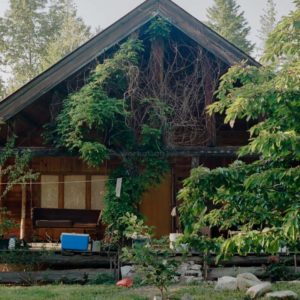Investing in off-grid housing can be a financially savvy decision for those looking to escape the grid and live sustainably.
However, it’s important to carefully consider the financial implications before taking the plunge.
From initial construction costs to ongoing expenses, there are several factors to keep in mind when evaluating the financial feasibility of off-grid housing.
We’ll explore these financial considerations and provide actionable tips for those looking to make the transition to off-grid living while maintaining a healthy bottom line.
Higher Upfront Costs
Off-grid housing often requires more expensive materials and systems, such as solar panels, wind turbines, and rainwater harvesting systems, which can increase the upfront costs.
This is because off-grid housing often requires specialized materials and systems to support self-sufficient living, such as solar panels, wind turbines, and rainwater harvesting systems.
These systems can be more expensive upfront, but they can also provide long-term cost savings through reduced reliance on public utilities.
For example, solar panels can generate electricity at a fraction of the cost of traditional utility companies, while rainwater harvesting systems can reduce water bills by collecting and storing rainwater for use in the home.
Off-grid housing may require specialized construction techniques and materials, such as insulated concrete forms (ICFs) or structural insulated panels (SIPs), which can also increase upfront costs.
However, the long-term benefits of off-grid housing, such as reduced energy and water bills, can make the initial investment worthwhile for those who are willing to commit to a self-sufficient lifestyle.
Ongoing Maintenance and Repairs
Off-grid systems require regular maintenance and repairs, which can be time-consuming and costly. Homeowners must be prepared to invest time and money in keeping their systems running.
Off-grid systems, such as solar panels and wind turbines, require regular maintenance and repairs to ensure optimal performance and longevity.
This includes checking and replacing batteries, inspecting and cleaning solar panels, and lubricating moving parts.
Failure to perform these tasks can result in reduced energy production, inefficient system operation, and even complete system failure.
Off-grid systems are often located in remote areas, which can increase the time and cost of maintenance and repairs.
Homeowners must be prepared to invest time and money in keeping their systems running, as well as be prepared for unexpected failures and repairs.
Regular maintenance and repairs are essential to ensure the long-term sustainability and cost-effectiveness of off-grid systems.
Higher Energy and Water Bills
Off-grid housing can have higher energy and water bills due to the lack of municipal utilities. Homeowners must budget for the cost of alternative energy sources, such as solar or wind power, and water collection and storage systems.
Off-grid housing, while offering a unique and self-sufficient living experience, can come with higher energy and water bills due to the lack of municipal utilities.
Instead of relying on public power and water supply, homeowners must invest in alternative energy sources, such as solar or wind power, and water collection and storage systems.
These alternative systems can be more expensive and require regular maintenance to ensure their optimal performance.
The lack of municipal utilities can result in higher costs for the installation and maintenance of these systems, as homeowners must often hire specialized contractors and purchase high-quality equipment to ensure reliable performance.
It is important for homeowners to carefully budget for these expenses and plan for the long-term maintenance of their off-grid systems to avoid any unpleasant surprises.
By taking these factors into consideration, homeowners can still enjoy the benefits of off-grid living while managing their energy and water costs effectively.
Unique Financing Challenges
Financing off-grid housing can be challenging due to the unique nature of the project. Homeowners may need to explore alternative financing options, such as personal loans or grants, to cover the costs.
Financing off-grid housing can be a challenging and complex process due to the unique nature of the project.
Conventional lenders may be hesitant to provide financing for off-grid homes because they do not fit the traditional mold of a residential property.
This can lead to limited access to traditional financing options, such as mortgages, which are often the most affordable and accessible forms of financing.
As a result, homeowners may need to explore alternative financing options, such as personal loans or grants, to cover the costs of their off-grid home.
Personal loans can be a viable option for financing off-grid housing, as they offer more flexibility and freedom compared to traditional mortgages.
Homeowners can use personal loans to cover the upfront costs of their off-grid home, including land purchase, construction, and infrastructure costs.
Personal loans can be secured through various financial institutions, such as banks, credit unions, and online lenders.
However, it’s essential to compare interest rates, terms, and conditions before selecting a lender to ensure that the loan is affordable and aligns with the homeowner’s financial goals.
Grants can also be a valuable resource for financing off-grid housing.
Governments, non-profit organizations, and private companies often offer grants to support sustainable and environmentally conscious projects, such as off-grid housing.
These grants can help cover the costs of the project, including land purchase, construction, and infrastructure costs.
Homeowners can research and apply for grants through various online resources, such as the U.S.
Department of Agriculture’s Rural Development program, the U.S.
Environmental Protection Agency’s (EPA) Brownfields program, and the U.S.
Department of Energy’s (DOE) Weatherization Assistance program.
It’s important to carefully review the eligibility criteria, application process, and award amounts before applying for grants to ensure a successful application.
Alternative energy sources, such as solar, wind, and hydroelectric power, can also help finance off-grid housing.
Homeowners can install these systems on their property and generate electricity, reducing their reliance on traditional energy sources and lowering their energy costs.
These alternative energy systems can also be financed through government incentives, such as the federal investment tax credit (ITC), and state-specific incentives.
Homeowners can consult with a professional to determine the feasibility and potential returns on investment for these systems before investing.
Homeowners should explore alternative financing options, carefully review the eligibility criteria and application process for grants, and consider alternative energy sources such as solar, wind, and hydroelectric power to generate electricity and reduce their reliance on traditional energy sources.
Consulting with a professional can help homeowners determine the feasibility and potential returns on investment for these systems before investing.
Long-Term Return on Investment
While off-grid housing can be more expensive upfront, it can also provide long-term financial benefits. Homeowners can save money on energy and water bills, and may also be eligible for tax incentives and rebates.
Off-grid housing may seem like a more expensive option upfront, but it can provide long-term financial benefits that far outweigh the initial costs.
By harnessing renewable energy sources like solar, wind, and geothermal, homeowners can significantly reduce their energy bills, saving thousands of dollars over the life of the system.
Off-grid homes often employ water conservation techniques and graywater systems, resulting in lower water bills as well.
Furthermore, many governments offer tax incentives and rebates to encourage the adoption of off-grid technology, making the initial investment even more affordable.
Over the long term, off-grid housing can provide a reliable, self-sufficient source of energy and water, protecting homeowners from fluctuating energy costs and providing a more sustainable living environment.
Property Value
Off-grid housing can increase property value, particularly in areas with high demand for sustainable living. Homeowners can potentially sell their property at a higher price if they include energy-efficient and sustainable features.
Off-grid housing can significantly increase property value, especially in areas with high demand for sustainable living.
By incorporating energy-efficient and sustainable features, homeowners can differentiate their property from traditional housing and appeal to environmentally-conscious buyers.
For instance, the use of renewable energy sources like solar and wind power can significantly reduce energy costs and lower the property’s carbon footprint.
Sustainable building materials and design elements, such as recycled materials and passive solar heating and cooling, can add value to the property and contribute to its long-term maintenance and durability.
As more people prioritize sustainability and reduce their carbon footprint, off-grid housing with energy-efficient and sustainable features is likely to become increasingly desirable, potentially increasing property values and providing homeowners with a competitive advantage when selling their property.
By investing in sustainable features, homeowners can not only reduce their energy costs and environmental impact but also enhance their property’s appeal and potential resale value.
Insurance Considerations
Off-grid housing may require specialized insurance coverage, such as for the alternative energy systems and water collection and storage systems. Homeowners must research and understand the insurance options available to them.
If you’re considering off-grid housing, be prepared to take a closer look at your insurance options.
Your unique energy and water systems may require specialized coverage, and it’s essential to understand what’s available to you.
Research and comparison of different insurance providers are important to finding the best coverage for your specific needs.
Some policies may offer additional coverage for alternative energy systems like solar panels or wind turbines, while others may provide specialized protection for water collection and storage systems.
Without proper insurance, you may be left with costly repairs or replacement of damaged systems, so make sure to consider the long-term risks and protect your investment in off-grid living.
Some insurance providers may offer discounts for eco-friendly features like energy-efficient appliances or sustainable building materials.
By taking the time to explore your options, you can ensure that you’re protected and prepared for any unexpected events that may arise.
Long-Term Sustainability
Off-grid housing requires careful planning and consideration for long-term sustainability. Homeowners must consider factors such as energy supply, water availability, and waste management to ensure that their home is self-sufficient and environmentally responsible.
When considering off-grid housing, careful planning and thoughtful consideration are essential for long-term sustainability.
Homeowners must examine various factors to ensure their home is self-sufficient and environmentally responsible.
One critical aspect is energy supply, which can be met through renewable sources such as solar, wind, or hydro power.
A well-insulated home with energy-efficient appliances and lighting can also help reduce energy consumption.
Water availability is another essential factor, and homeowners may need to consider rainwater harvesting or a private well to ensure a reliable water supply.
Moreover, waste management is an essential aspect of off-grid living.
Homeowners must plan for the disposal of wastewater, food waste, and other organic materials.
Composting toilets and gray water systems can help reduce the amount of waste that needs to be disposed of, while recycling and upcycling can help minimize the amount of waste that enters landfills.
By carefully considering these factors, homeowners can create an off-grid home that not only minimizes its environmental impact but also provides a comfortable and sustainable living space for its inhabitants.
Want More? Dive Deeper Here!
Hey there! If you’re the type who loves going down the rabbit hole of information (like we do), you’re in the right spot. We’ve pulled together some cool reads and resources that dive a bit deeper into the stuff we chat about on our site. Whether you’re just killing time or super into the topic, these picks might just be what you’re looking for. Happy reading!






